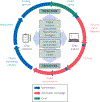Health Disparities, Clinical Trials, and the Digital Divide
- PMID: 38044003
- PMCID: PMC10825871
- DOI: 10.1016/j.mayocp.2023.05.003
Health Disparities, Clinical Trials, and the Digital Divide
Abstract
In the past few years, there have been rapid advances in technology and the use of digital tools in health care and clinical research. Although these innovations have immense potential to improve health care delivery and outcomes, there are genuine concerns related to inadvertent widening of the digital gap consequentially exacerbating health disparities. As such, it is important that we critically evaluate the impact of expansive digital transformation in medicine and clinical research on health equity. For digital solutions to truly improve the landscape of health care and clinical trial participation for all persons in an equitable way, targeted interventions to address historic injustices, structural racism, and social and digital determinants of health are essential. The urgent need to focus on interventions to promote health equity was made abundantly clear with the coronavirus disease 2019 pandemic, which magnified long-standing social and racial health disparities. Novel digital technologies present a unique opportunity to embed equity ideals into the ecosystem of health care and clinical research. In this review, we examine racial and ethnic diversity in clinical trials, historic instances of unethical research practices in biomedical research and its impact on clinical trial participation, and the digital divide in health care and clinical research, and we propose suggestions to achieve digital health equity in clinical trials. We also highlight key digital health opportunities in cardiovascular medicine and dermatology as exemplars, and we offer future directions for development and adoption of patient-centric interventions aimed at narrowing the digital divide and mitigating health inequities.
Copyright © 2023 Mayo Foundation for Medical Education and Research. Published by Elsevier Inc. All rights reserved.
Conflict of interest statement
POTENTIAL COMPETING INTERESTS
Dr Brewer is supported by the Robert A. Winn Career Development Award from Bristol Myers Squibb Foundation. The other authors report no competing interests.
Figures


References
-
- Yao X, Attia ZI, Behnken EM, et al. Batch enrollment for an artificial intelligence-guided intervention to lower neurologic events in patients with undiagnosed atrial fibrillation: rationale and design of a digital clinical trial. Am Heart J. 2021;239:73–79. - PubMed
Publication types
MeSH terms
Grants and funding
LinkOut - more resources
Full Text Sources
Medical
Research Materials
Miscellaneous

